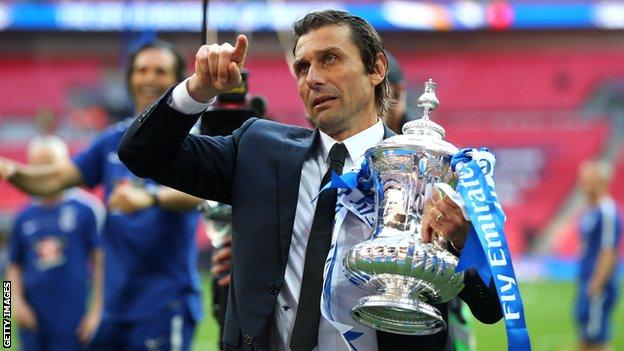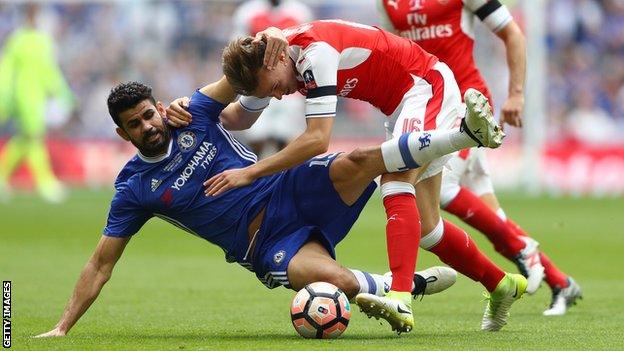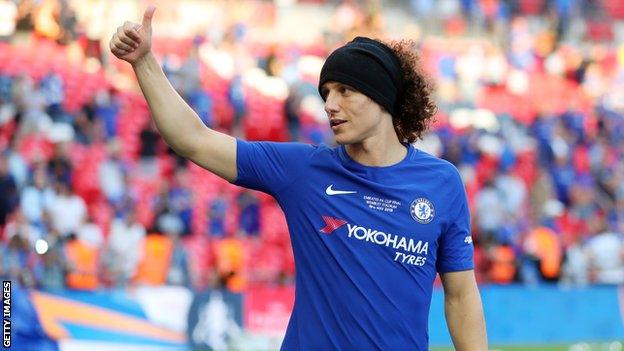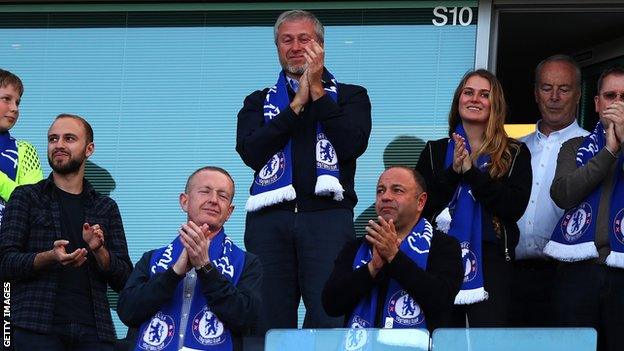Antonio Conte: Why did Italian's Chelsea reign turn sour?
- Published

Conte's last act in charge of Chelsea was to deliver the club its eighth FA Cup trophy
It has taken far longer for Antonio Conte and Chelsea to part company than initially thought likely, mainly because of the compensation issues that needed to be resolved.
However, for the seventh time in a decade, Chelsea are changing their manager.
Conte delivered two trophies in two seasons. The former Italy boss guided the Blues to the Premier League title in his first campaign but the FA Cup was considered a poor return last season.
Conte's 65% win percentage was higher than anyone who spent more than 40 games in charge of the club since Avram Grant left in 2009 - but a premature exit for the 48-year-old former Italy and Juventus boss was always likely, explains BBC Sport's Simon Stone.
Has he been the 'real' Conte?
The warnings started coming even before Conte had defied expectations to win the title in his debut season.
A posse of Italian journalists had attached themselves to the former national coach to chronicle his time at Stamford Bridge for an expectant public back home.
They had been startled by Conte's smiling, jovial demeanour.
This was a man known for his short fuse, who resigned at Juventus a month before the start of the 2014-15 season, furious at the club's botched transfer policy, annoyed at their pre-season schedule and irritated by those exerting influence behind the scenes.
In that brilliant first campaign in London, Conte's only significant issue came with former Chelsea boss Jose Mourinho, who was angered by what he perceived to be the Italian's excessive celebrations, external at the end of a 4-0 home win over Manchester United.
Insiders at Chelsea were told by the Italian contingent that, with a combustible figure like Conte at the helm, the serenity could not last. It was not long before they were proved right.
Where did it start to go wrong?

Diego Costa won the Premier League twice with Chelsea
Nearly everyone at Chelsea acknowledges that, as manager, Conte was within his rights to decide he could manage perfectly well without Diego Costa.
The Spain international may have scored 52 goals in 89 Premier League appearances over a three-year spell in which the Blues won two titles.
He may also have been one of the most feared forwards in the English game.
But Costa was notoriously difficult to control and it was reasonable that Conte had no wish to extend their working relationship beyond a single season.
What astonished and infuriated the Blues hierarchy was the method by which the manager told his player his services were no longer required: a text message, which Costa made public in June while on international duty with Spain.
As well as any damage inflicted in terms of Chelsea's standing, financially it was a disaster because Costa made it clear he would not go anywhere apart from his former club Atletico Madrid.
Chelsea's negotiating position had been stripped away. The player went on strike as the clubs haggled, and it was September before a £57m deal was concluded.
In between, Conte had signed a contract of his own - an increased salary a reward for his title success. Strangely though, it did not extend beyond the two years remaining on his initial deal.
These two factors ensured the early weeks of Chelsea's Premier League defence were played against a backdrop of negativity regarding the manager's future and his frosty relationship with senior players.
Conte's relationship with the rest of the dressing room?
The row with Costa was only the start of Conte's downturn in relations with his squad. Midfielder Willian is acknowledged to be one of the most popular, easy-going and laid-back members of the Chelsea squad.
When the 29-year-old Brazilian marked Chelsea's FA Cup final victory on 19 May on social media, he did so by posting a picture of the entire Blues squad and backroom team on the Wembley pitch with the trophy - but completely covered the image of Conte with three cup emojis, one on top of the other.
In public, Chelsea did not respond. Privately, they felt if relations between Willian - the Chelsea players' player of the year last season - and Conte had broken down to such an extent, how bad must they be with other, more intense figures within the squad?

Defender David Luiz has been restricted to 17 appearances for Chelsea this season
Although ruled out by knee and ankle injuries for the past three months of the season, Willian's compatriot David Luiz started only four games in three months after questioning Conte's team selection before the Champions League hammering by Roma on 31 October.
Forward Eden Hazard, a player Chelsea are desperate to keep, has had his commitment questioned.
Then there is the training, with Conte insisting on driving his players hard through their most physically demanding period of the season, when it was felt all they actually needed was to be kept ticking over. Decisions were not explained.
Even during Mourinho's two spells in charge at Stamford Bridge, there was the knowledge that while the Portuguese had a routinely stern face when on media duty, behind the scenes he was often very different and had a funny side that kept coming to the surface, routinely playing pranks on staff members.
Conte had none of this. On occasion he did not even speak to his own coaches, and hardly ever with his players. There were no arms around the shoulder or words of comfort in times of professional trouble.
There has to be distance between a manager and his players. This has been more like a schism.
Where does the power lie - and why?
There are plenty of voices at Chelsea. There is chairman Bruce Buck, chief executive Guy Laurence and directors Marina Granovskaia and Eugene Tenenbaum. But only one voice really matters - and that belongs to owner Roman Abramovich.
The Russian billionaire has had issues concerning the renewal of his UK visa but any idea this would be an impediment to him disposing of Conte's services was fanciful.
The Italian is the 10th manager Abramovich has got rid of, including Mourinho twice. He has done it face to face once. Decisions are taken quickly. Implementing them is a straightforward process.
And while Manchester United under Sir Alex Ferguson and Arsenal, initially at least, under Arsene Wenger underline the success that can be achieved by sticking with one man, Chelsea's alternative approach has not prevented them from becoming the most successful club in England since 2005, winning 15 major trophies.
The equation for Abramovich was twofold.
Firstly, did he think Chelsea would improve under a manager about to enter the final year of his contract?
Secondly, knowing how difficult some of the relationships had become, was he prepared to put his players through the same kind of turbulence they had experienced for the past 12 months?
The answer was no.

Roman Abramovich has enjoyed huge success since buying Chelsea in 2003
What happens now?
Chelsea's fans sang Conte's name during the FA Cup final win at Wembley.
However, there were some who wanted the Italian sacked after the 3-0 hammering at Newcastle on the last day of the league season six days earlier, because they did not believe their club could possibly beat Manchester United with morale so low.
There is no reason to believe they will not rally behind Conte's replacement - expected to be Maurizio Sarri - when the new season begins in August.
After a decade of spending the most money on the best players, there does appear to be a new financial reality at Chelsea, with Abramovich demanding value in addition to success.
The Blues' net transfer spend over the past five years has been £44.4m, compared to Manchester City's £112.6m and Manchester United's £87.5m.
Time will tell whether this means more focus is placed on using the growing number of promising youngsters emerging from the club's academy - Chelsea have won the FA Youth Cup for the past five years.
Whether more trust will be placed in the likes of Ruben Loftus-Cheek, who went to the World Cup with England after a season on loan at Crystal Palace, rather than spending £15m on Ross Barkley, who did not go to Russia after starting just two games having signed from Everton in January, remains to be seen.
However, one thing is certain: Conte will not be involved in the process.